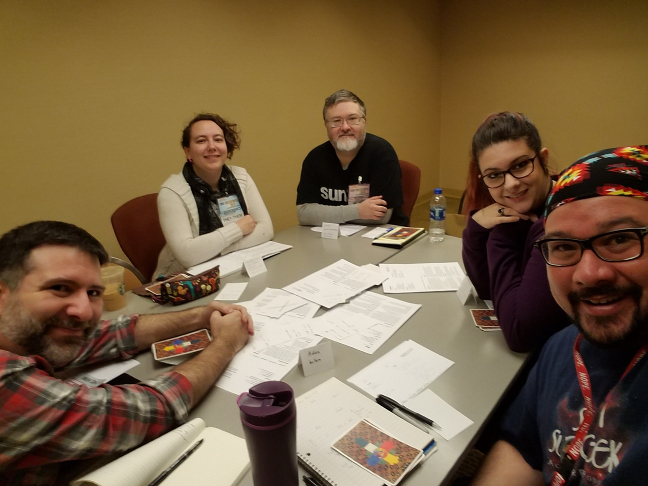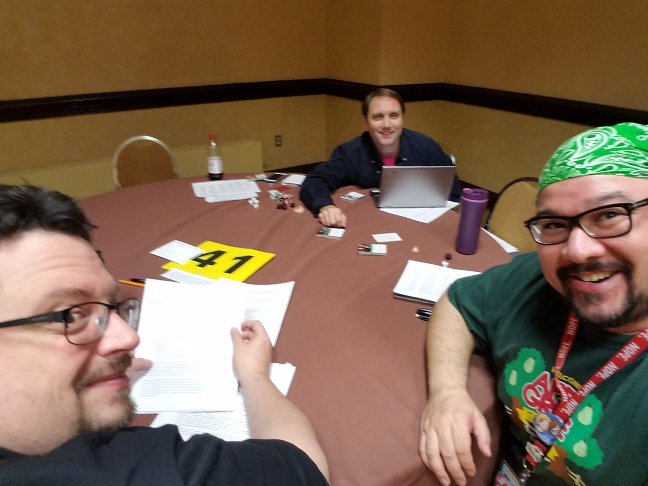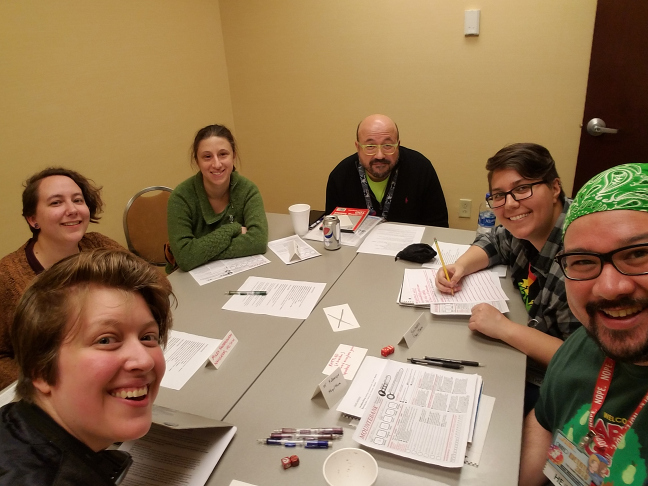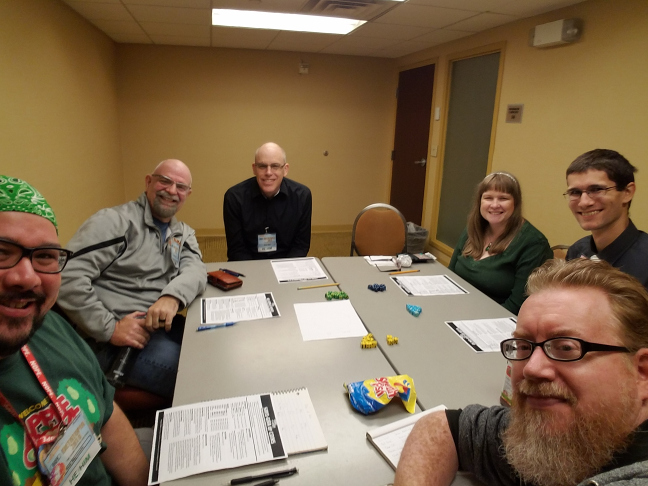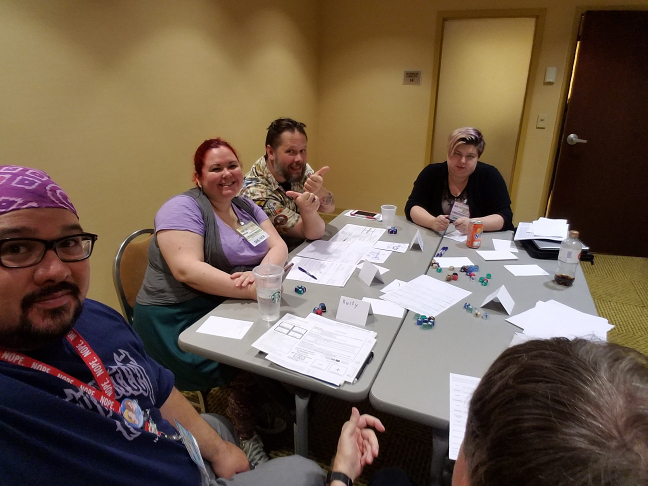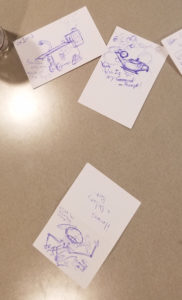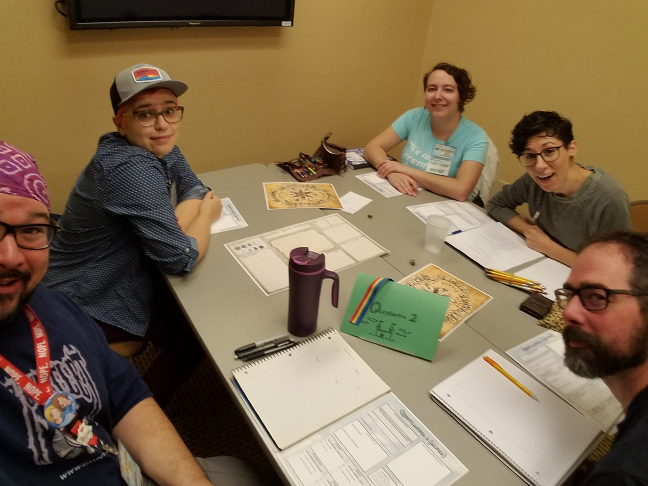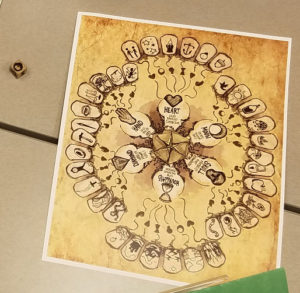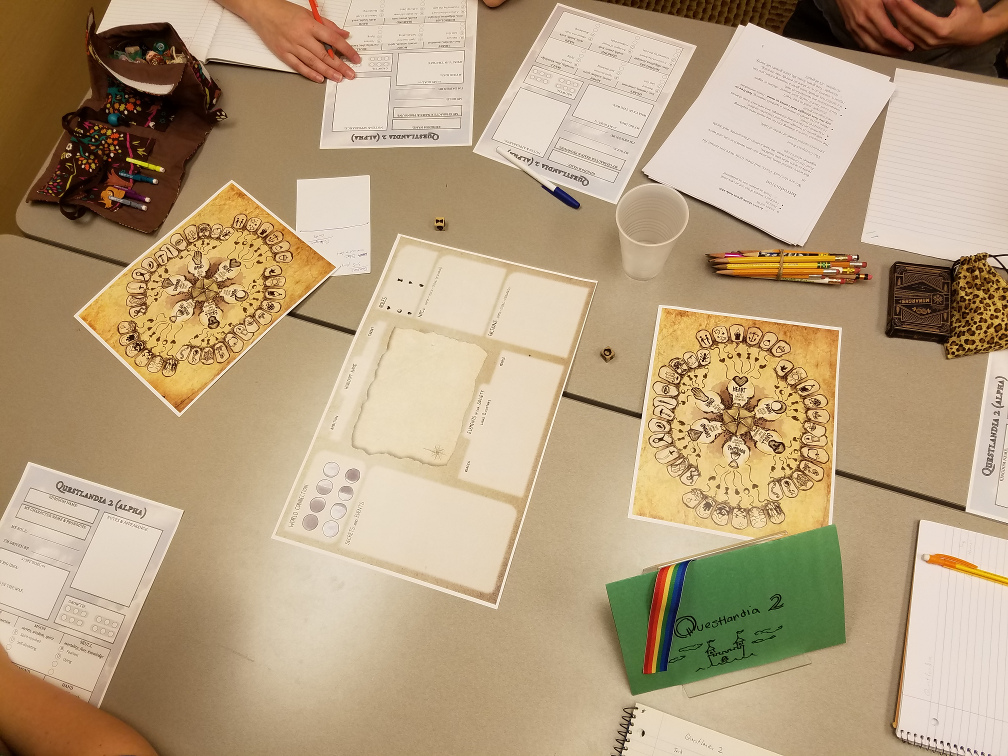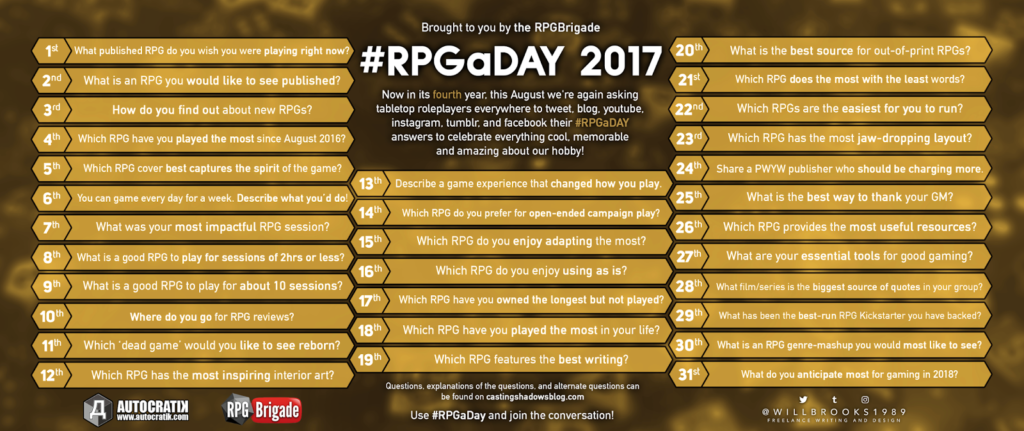I have returned from a swell time at Queen City Conquest in scenic Buffalo, NY. This marked the seventh year of this convention, but only my second time in attendance. It has quickly established itself as one of my favorite cons, but that's no surprise, as the organizing team (Lake Effect Gaming) has ties to (and overlap with) the "GEM" collection (Gnome Stew, Encoded Designs, and Misdirected Mark), which themselves forms a pretty overlapping Venn diagram, as well. Additionally, this year's QCC featured some Double Exposure representation with their "Play to Win" board game program being present, so all-in-all, there were plenty of familiar faces around.
Not that I took much advantage of that! The way this year's QCC landed on the calendar, it ended up sandwiched right between my partner's birthday and Rosh Hashanah, so between engagements on either side and the travel time, I only ended up spending a day-and-a-half at the con. I did have a few fleeting encounters with friends that I don't see nearly often enough, so it was nice to at least get some hellos and hugs in while heading between games or on a mid-game break, but this con was definitely not one of my more social ones. I did get a few good games in, though, so let's get to it!
Monster of the Week by Michael Sands/Evil Hat
"Reign of the Shadow Lord" (but not really) run by Christopher Sniezak
At last year's QCC, I played in a three-session "long con" of Dungeon World that Chris ran, and this year his offering was a two-session MotW. Unlike last year's arrangement, which was three single slots spread over three days, this year was a single double-length slot plus a lunch break, so it really was one long gaming session. The player group was almost the same as the previous year: myself, Alexandra, and Rob B. were all returning players, while the spot occupied last year by Jesse was ably filled by the equally excellent Eric. Monster of the Week is a Powered by the Apocalypse game and, as you might surmise from the title, geared for episodic monster-hunting, by default in a modern setting where the monsters and their world are not part of everyday, quotidian life—settings like Supernatural, Buffy the Vampire Slayer, and The X-Files.
What made this session notable from the get-go is that the players managed to derail things before the game even really got started. The original pitch involved a scenario in a demon-infested post-apocalyptic Buffalo shrouded in unending darkness, with part of the setup being that the crew was coming off a previous victory over a demon in Chicago. During character creation, though, we wound up so focused on figuring out what had happened in Chicago that the background event became the actual session we played out. Chris, the GM, even went so far as to tear up the prep notes he had printed out for the intended game: "Guess we won't be needing these!"
The game was super fun. Though I'm already well-aware of Chris' chops as a GM (plug: and you can be, too! Check out the Misdirected Mark Podcast!), I still really have to hand it to him for rolling with just completely chucking the adventure he had prepared for the con and instead improvising a whole new story from the ground up, and for a double-length session, no less! The players were also excellent, of course. Rob B. portrayed Ziggy, the aging ex-hippie turned expert monster-hunter who tours the country in a Winnebago. Alexandra portrayed Zephyr, half-human/half-fae/total-badass and secretly Ziggy's daughter. Eric portrayed Anastasia, a conspiracy theorist and online troll who had unwittingly helped usher in Chicago's takeover by the Dead-eyed Demon. I portrayed Laszlo ("not his real name"), a con artist and fake storefront psychic who got recruited into demon-fighting and now has to keep pretending to have powers. There was plenty of excitement and drama to go around; the action of the game was punctuated by some pretty great interpersonal character drama, and it was a pretty great time all around.
Like most PbtA games, Monster of the Week strives to emulate a specific genre, in this case, as mentioned above, contemporary episodic monster-hunting stories. We played a lightly modified version in which Chris introduced some additional basic moves to further push (1) the investigative portion of the story and (2) the emotional involvement of the main characters. The emotional involvement definitely added a new dimension to the kinds of character interplay supported by the base game, and highlighting the investigative portion introduced a structural change to the intention of the original. Both changes were satisfying, and both (as any PbtA hacking tends to do) furthered the particular kind of game experience that Chris wanted to run.
Dusk City Outlaws by Rodney Thompson/Scratchpad Publishing
"The Funeral Job" run by Jennifer Adcock
Dusk City Outlaws is first and foremost a heist game. I remembered when I first heard about it, I had thought it was an Old West setting, but that was definitely not the case. The setting struck me as much more of a fantasy Renaissance Europe and between the setting and the focus on a criminal crew pulling of heists, it actually superficially put me in mind of Blades in the Dark, but that's pretty much where the similarities between the two end. Dusk City Outlaws carries a much lighter ruleset, for one thing, as well as what I perceived as a lighter tone. It's also set up nicely for one-shots and out-of-the-box play. And when I say "out-of-the-box," that's much more literal with this game that with other RPGs.
DCO presents much like a board game, complete with colorful, arty components, custom dice, and the whole nine. There isn't actually a board, though, which I guess might give it away, but even so, it's got a lot of that visual and tactile appeal which so often draws people to tabletop games. It's solidly an RPG, though, with characters being built broadly from a combination of a cartel to which they are a part and a role they play in the crew. The system uses percentile rolls and skill lists that are built into the character roles, and play is structured within a set number of planning or legwork phases that lead up to the execution of the heist proper. It is, again, a game tightly focused on telling a particular kind of story, but in contrast to the PbtA-style "play to find out what happens" aesthetic, this one leans on pre-written scenarios that the characters investigate and explore.
I'd gamed with Jen at last year's con, and the player group was a mix of familiar and unfamiliar to me. I knew Glenn, though I can't recall offhand if I'd played in a game with him before. Drew I had met previously, but I know we hadn't played before, because, shockingly, the first time I met him wasn't at a con! There was Emalyn, who I'd seen around but didn't know, and Rob H., who was brand new to me.
I actually don't remember a lot of details about the characters, I think largely because a lot of the character is made up of the cartel, which is setting-specific and with which I was unfamiliar. Glenn played Lenox, who I recall was like a theater performer or something similar. Drew played Ulyesses, who was an alchemist and belonged to the cartel that dealt with mortuaries and the like. Emalyn played something like an aristocrat or noblewoman named Elanore. Rob H. played Simon, and I can't remember his specialty, but I believe he made a lot of disguises. I played Nikolai, kind of a wheelman/smuggler type, but mostly I made hay out of being somebody in the crew with a legit job.
It's a fun game, and I can see the appeal, but I'm not sure it's for me. The primary part of the game, aside from the heist itself, is basically gathering information and making the plans for the heist, which doesn't hugely speak to me as far as gameplay goes. I do enjoy the heist genre, and I also like heist games, but I go for ones that deal more in flashbacks than planning, something like Leverage or the aforementioned Blades in the Dark. This one strikes me as coming more from an old-school module kind of tradition, where it's on the players to ask the right questions and put together the right puzzles, which isn't my cup of tea, I guess. It's not to say that the game doesn't pack in the action and excitement, because when the shit goes down, it goes down, but to get to the action, it feels like you first go through a mystery, and it's just not my particular bag.
Iron Edda Accelerated by Tracy Barnett/Encoded Designs
Run by Tracy Barnett
The original Iron Edda: War of Metal and Bone is a Fate Core-based game that came out a few years ago, and the same developer is returning with Iron Edda Accelerated, a new version based on, well, Fate Accelerated. IEA just completed its Kickstarter campaign a few weeks ago and so is not yet on the market. I've known Tracy for some time now, but this con was the first time we met face-to-face! It was also a great way for it to happen, because I was really excited to back this game on Kickstarter, and I was really looking forward to playing. I was not disappointed.
There was a lot of familiarity in the player group. Notably, one last-minute addition to the game was the same Eric B. who I played with earlier in the Monster of the Week game. Also present were Tim, who I've seen around and gamed with at these cons before, Wen, a Gnome Stew gnome along with Tracy, John, whom I kinda know via the Misdirected Mark community (#Chatroom4Life), and Rebecca, who I pretty sure I've gamed with before at QCC, but maybe have just seen around.
The world of Iron Edda is based on Norse mythology and tells the story of the progression of Ragnarok, which has come in the form of Dwarven giant metal war robots, and the Vikings who are fighting them with, among other things, the animated skeletons of Giants. If it sounds to you from that description like an epic Viking Fantasy Pacific Rim knock-down-drag-out, you wouldn't necessarily be wrong, but honestly the strength of this game to me is the "session zero" part, which loads up on the collaborative worldbuilding and group character creation, which is, as you may know, what really gets me going in an RPG. In my personal estimating, I'm putting IEA up there with Headspace and Backstory Cards as the one of the top collaborative building toolkits on my shelves. It's a strong prompting engine with a huge amount of room for creativity, and it's one of those pre-game processes that builds in immediate emotional investment from players and tremendous idea fodder for GMs. Sold!
The other thing that really grabs me about this game is that you're also not necessarily building a party, per se; the group is literally just a collection of people living in this world. They may be working together...or they may not. There's something Apocalypse World to me about that (which I guess is only natural given the subject matter of both games), and I know that it's the kind of thing that really needs support from the right group of players, but when you've got that, look out; things can really get cooking.
The game centers around a single community, a holdfast, which is trying to make its way in these final days. In our story, the previous leader of our holdfast (the jarl), had died, along with his chosen heir, so we were in the midst of choosing a new leader. Wen played Halvor, who was next in line to become jarl but who didn't want the job. Tim played Helm-teer, the seer of the holdfast who was in charge of things while a new jarl was being selected. John played Ivarr, a Runescribed in the holdfast dedicated to decay and change. I played Bacchus, an aging warrior bound to one of the skeletal giant war machines and actively seeking to drag the holdfast into war. That's four of the characters, you'll note, while we had six players. Eric played Astrid, the self-styled "Jarl of Jarls," who came from outside the holdfast and looked to take it for herself. And Rebecca played Gäll, a skald and the herald of Astrid.
With all of that and the introduction of an additional NPC vying for the seat of power and the widow of the previous jarl just vying for power in general, let me tell you, we played an entire session and never once joined a battle or encountered a giant metal war robot. It's based on Fate Accelerated, so I already have an idea of what combat would be like system-wise, so I was really pleased with how well the game also supported interpersonal connections and interactions. I had a great session, and I'm really excited about the game.
In Closing
Like I said before, I didn't participate much by way of socializing at this con. I did get to meet a lot of online friends in the flesh for the first time, which was pretty darn nice. I think I'm taking away from this the lesson I always take away from cons (and then always forget) about how I shouldn't overschedule if I want to hang out with people, but also I'm giving myself something of a pass this time around for having not a lot of time and also for having other stuff going on. So...it's fine. There will be other cons and other chances to hang out with people.
As far as haul goes, I did secure my two primary objectives: the ashcan of Crossroads Carnival (Kate Bullock/Magpie Games) and the ashcan of Hydro Hacker Operatives (Phil Vecchione/Encoded Designs). (Big shoutout to my favorite vendor Jim Likes Games for helping make my dreams come true!) Both Kate and Phil are dear friends, and I have been incredibly excited about both these games for a long time. I'm pumped about finally holding these ashcans in my hands! Both of these probably deserve future posts of their own.
I also picked up a copy of Zany Zoo! (Daniel Kwan, Patrick Keenan, and Daniel Groh/Dundas West Games) when I happened to run into Daniel and had a chance to introduce myself. I've been following him for a little while and had kinda been tracking Ross Rifles, but what I'm really encouraging people to check out is his new podcast (with co-host Agatha Cheng), Asians Represent. At the time of this posting, only episode zero is out, but I'm excited about the podcast, which is highlighting Asian game creators and discussing Asian cultural influence in games. Look for it on the One Shot Network!
There was also a strong Gauntlet presence at QCC, but again, I sadly didn't spend a lot of time hanging out. I got some QCC swag, and owing to a running joke in GEM circles, Senda got me a squishy toy banana. Other than that, I didn't take a lot of pictures or anything, so this seemed like a good con to recap in order to try to get back on the blogging horse. Also, the last con I recapped was Metatopia in 2014, so...it's fair to say that a lot has been going on since then.
As always after a convention, I'm left bemoaning a few missed opportunities, but one of the biggest was that I didn't get to try out Orun. I was hoping I'd have the chance to play or at least talk with Eloy Lasanta, who was a guest at the con, but I couldn't make it work. Among the many things I didn't have time for, this was the one I wish I could have snuck in.
In any case, it was a really good con, and under different circumstances, I would have loved to have taken in more of it. As it was, though, I had a lot of fun, and definitely plan to go back again next year. Until next time, then, farewell!
